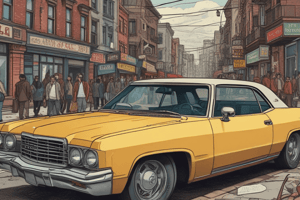Podcast
Questions and Answers
What is the main focus of assessment criteria 2.3 in criminology discussed in the video?
What is the main focus of assessment criteria 2.3 in criminology discussed in the video?
Sociological theories of criminality, specifically Merton's strain theory
Name five structural theories of criminality that students are expected to be knowledgeable about.
Name five structural theories of criminality that students are expected to be knowledgeable about.
Functionalist, Marxist, Interactionist, Labeling, Realist theories of crime
According to Merton's strain theory, what societal aspect leads to strain and deviant adaptations?
According to Merton's strain theory, what societal aspect leads to strain and deviant adaptations?
The unequal nature of American society in the early 20th century
List the five adaptations to strain outlined by Merton in his theory.
List the five adaptations to strain outlined by Merton in his theory.
What do Innovators, according to Merton, tend to do in their pursuit of financial success?
What do Innovators, according to Merton, tend to do in their pursuit of financial success?
Explain Merton's strain theory and how it relates to the unequal nature of American society.
Explain Merton's strain theory and how it relates to the unequal nature of American society.
Describe the five adaptations to strain outlined by Merton in his theory.
Describe the five adaptations to strain outlined by Merton in his theory.
Explain the difference between Innovators and Retreatists according to Merton's strain theory.
Explain the difference between Innovators and Retreatists according to Merton's strain theory.
How do Rebels differ from Conformists in Merton's strain theory?
How do Rebels differ from Conformists in Merton's strain theory?
Discuss the implications of Merton's strain theory on understanding criminal behavior in the early 20th century American society.
Discuss the implications of Merton's strain theory on understanding criminal behavior in the early 20th century American society.
Flashcards are hidden until you start studying
Study Notes
- The video focuses on assessment criteria 2.3 in criminology, specifically looking at sociological theories of criminality, with a focus on Merton's strain theory.
- Students are expected to have knowledge of structural theories of criminality, including functionalist, Marxist, interactionist, labeling, and realist theories of crime.
- Merton's strain theory explains why people commit crimes by emphasizing the unequal nature of American society in the early 20th century, leading to strain and deviant adaptations.
- Merton outlines five adaptations to strain: Conformity, Innovation, Ritualism, Retreatism, and Rebellion, each describing different responses to achieving the American dream.
- Merton suggests that Innovators are likely to adopt illegitimate means for financial success, while Retreatists drop out of society and Rebels seek alternative goals through protests and sometimes criminal activities.
Studying That Suits You
Use AI to generate personalized quizzes and flashcards to suit your learning preferences.




